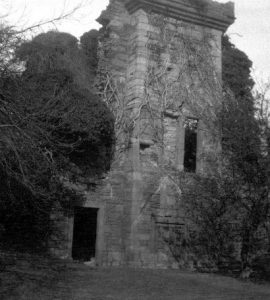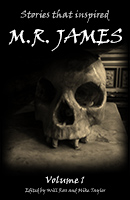 This episode join Mike and Will as they don their kilts and sporrans and head north of Hadrian’s wall for some Scottish horror (no, not the midges) as we explore ‘The Open Door’ by Margaret Oliphant!
This episode join Mike and Will as they don their kilts and sporrans and head north of Hadrian’s wall for some Scottish horror (no, not the midges) as we explore ‘The Open Door’ by Margaret Oliphant!
Big thanks to Kirsty for chilling us to the bone with her readings for this episode.
Show notes:
- Margaret Oliphant (Wikipedia)
Margaret Oliphant (1828 – 1897) was a prolific and very popular author in her day, and M.R. James describes ‘The Open Door’ as one of only two ‘… really good ghost stories I know in the language wherein the elements of beauty and pity dominate terror.’ - Colinton House, Edinburgh (oliphantfiction.com)
‘Brentwood house’ in the story was mostly likely inspired by this house, where Oliphant stayed on a number of occasions as the guest of her friend William Blackwood III, publisher of Blackwood’s Edinburgh Magazine in which this story was first published. The house, now a school, features a picturesque castle ruin in the grounds, complete with open doorways leading to nowhere. - Lasswade, near Edinburgh (Leedstrinity.ac.uk)
While the house in the story is almost certainly based on Colinton House, the adjoining village of Brentwood is more likely to be based on the village of Lasswade, where Oliphant grew up. Like Lasswade, the village in the story is described as being a centre for paper-making. This article by Rosemary Mitchell also provides some fascinating analysis of the religious symbolism in the story. - Margaret Oliphant and the Romantic Novel (dangerouswomenproject.org)
This essay by Laura Witz, subtitled ‘Subtle subversions of Victorian gender conventions’, argues that Oliphant was a feminist whose fiction struggled against the restrictive gender norms of the time. Not that you see much of that in ‘The Open Door’, sadly. - The Margaret Oliphant Fiction Collection (oliphantfiction.com)
This website contains not only a bibliography of Oliphant, but also plot synopsis for all her published fiction. The ‘Stories of the Seen and the Unseen‘ section will be of particular interest to fans of the ghost story. - Bogle (Wikipedia)
A ‘bogle’ is a uniquely Scottish ghost of folkloric creature, one which the stable-master Jarvis is particularly keen to insist he is not afraid of in this story! - Mass Hysteria (Wikipedia)
The doctor is keen to attribute the multiple ghostly sightings as an example of mass hysteria. The wikipedia page on mass hysteria contains some fascinating examples of this, from mewing nuns in the middle ages to modern forms of viral mass hysteria reportedly spread by the internet.
Podcast: Play in new window | Download
Subscribe: RSS
Tags: Blackwoods Magazine, Colinton House, Edinburgh, Ghosts, Lasswade, M.R. James, Margaret Oliphant, Scotland, The Open Door








Getting worried there lads but glad that you’re back!
Refreshing to listen to a Scottish story that didn’t involve the typical staple of Hiberian horror (the Haggis). When Mike referenced the Crucible, I hadn’t recalled any clergymen refereeing the last snooker championship but I’ll go back and have another look.
Talking of clergymen crossovers, love the idea – what if the Colonel was accompanied by the Kung Fu priest from Brain Dead?
It was mentioned near the end of the podcast about the best short stories based on Scottish ballads, or something of that nature, I have always thought Shirley Jackson’s “The Daemon Lover”, taken from the Scottish ballad of James Harris, was one of the great unsettling piece of short fiction. A great piece of writing.
ABOUT TIME.
ABOUT TIMEEEEEEEEEEEEEEEEEEEE!
The wandering juniper bush reminds me very much of the ‘moving’ bush or tree in James’ story ‘Mr Humphreys and his inheritance’. I wonder if James got that idea from this story?
Another fine episode and another fine story. I also was surprised by the parson’s role in the solution.
But I think I disagree with your discussion on our protagonist’s attitude toward his daughters. My impression was that he felt they needed less from him, because they were capable, than his son, who was not. I don’t have the story here, but I think he says they are getting a fine education and all they need so that they will be able to find a marriage with someone better than their mother ended up with. And that they are well on their way toward this. Maybe not liberation, but they’re not the ones so emotionally drained by the ghost that they are laying and moaning in bed…
I could be remembering wrong, but that was my impression. The girls seemed too busy for such nonsense!
Great show guys! Thanks for introducing me to this one, i hadn’t previously heard of it. I wonder if the minister is based on real life Scottish clergyman and author George Macdonald (1824 – 1905). The physical description matches, as does Macdonald’s theology (he was famously disciplined by the church for suggesting that Gods mercy might extend to non Christians). He was a well known literary figure in his own day, and friend and contemporary of both Mark Twain and Lewis Carroll, so it’s entirely possible that Oliphant would have known him. He was a massive influence on C S Lewis, and appears as a character in his book “The Great Divorce”. Anyway, just a few thoughts. Loved the story, dont think that the character of Colonel was especially sexist, just a man of his time, especially one who had spent his life in the fairly macho world of the 19th Century British army.
Nic S,
Your idea is intriguing. Margaret Oliphant did indeed know and like George Macdonald. Per the biography The Equivocal Virtue by the Colbys, she knew him since at least 1862 – and apparently they corresponded too.
Is it a mere coincidence that I am currently listening to a novel that mentions BOTH some kinds of ruins, and a kernel, I wonder? :p
About the daughters in the story, I thought it’s funny that the daughters were in perfect health, but the son was the sickly and emotionally fragile person. I think this was what Oliphant wanted to say that sons could also be fragile little creatures. In her time when the ideal woman were preferred as delicate dainty little things that needed to be cared for. Nice to see this bit of snark.
I liked this story until the end when it turned a little silly, it wasn’t dark enough.
“The lad was doubly precious to us, being the only one left us of many.” I took this as having emphasis on “lad”, and therefore suggesting he was the only son left to them of many sons, and that there was no slight intended toward the daughters as not counting, so to speak, as their children. If the parents had lost a number of sons, it’s natural that they be overly anxious about this little guy. It may have been that the other sons had also not been very robust.
My mum and one or two of her siblings used to ride a horse to school. I think they took turns at sitting on it while one walked. This is country Victoria in the 1930s. They lived on a farm and school was in town. She told me that on one occasion, she was crossing someone else’s farm and got chased by a bull. Now that would not be a pleasing terror!